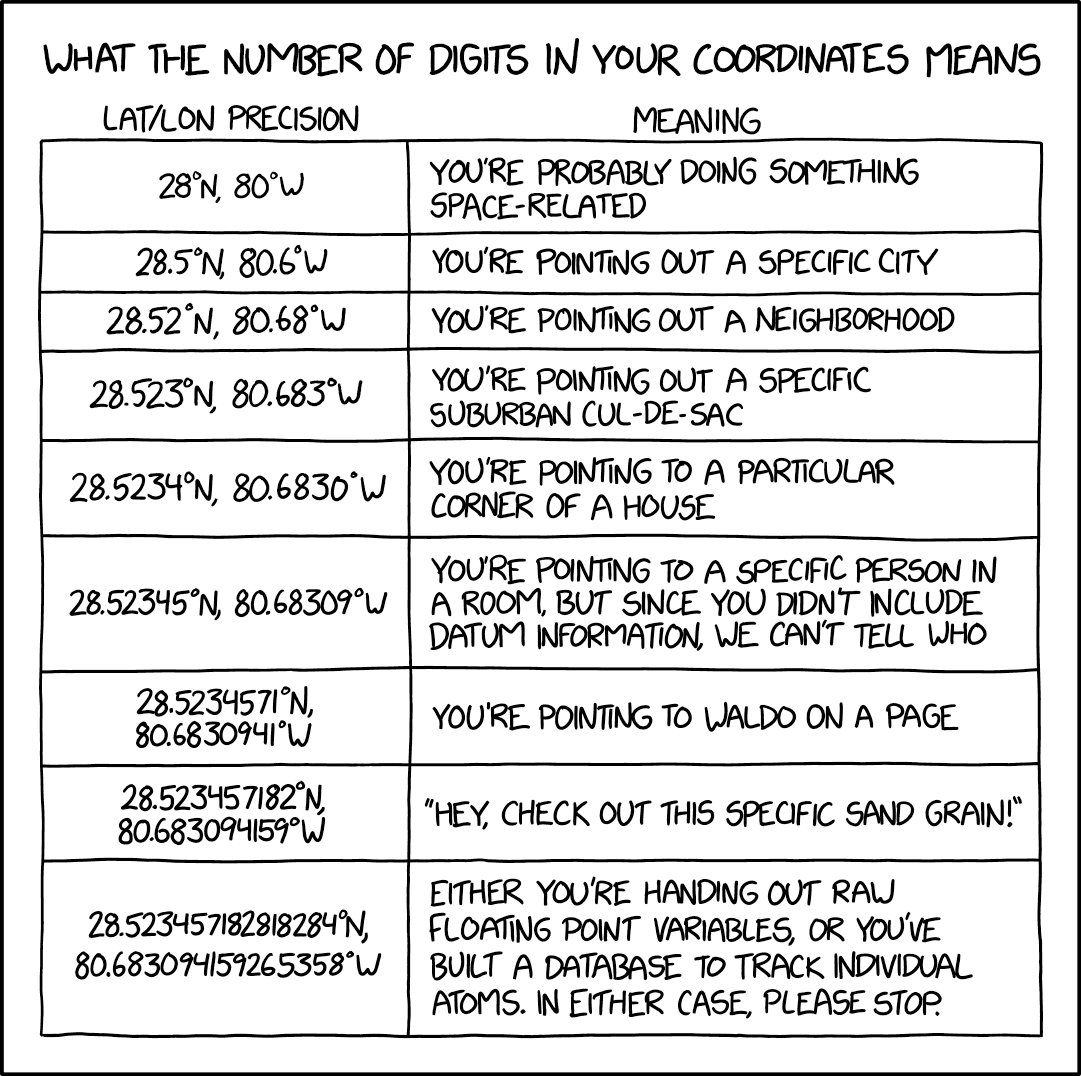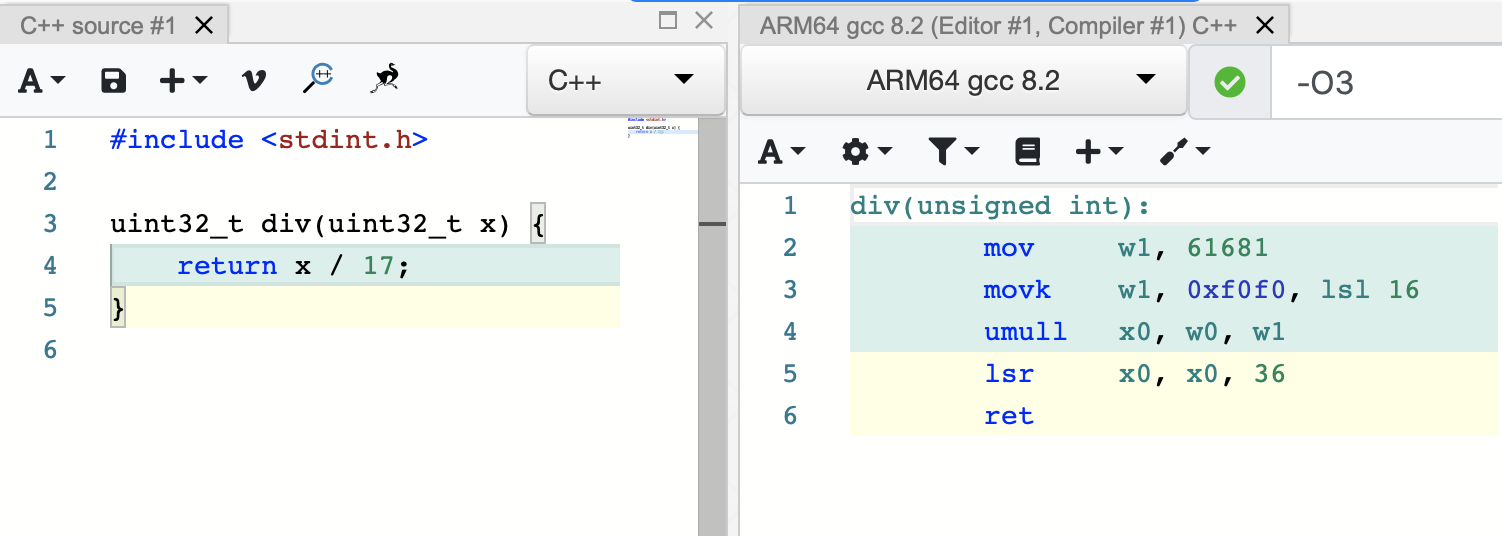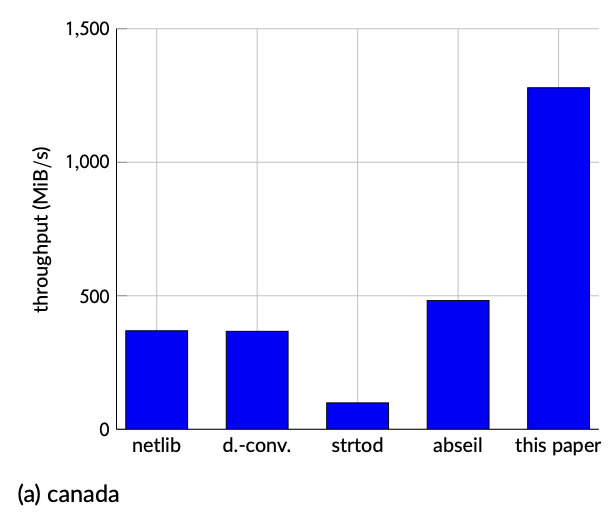Floats are hard
> 0.1 + 0.2 == 0.3
false
Generic rules regarding "exact" IEEE support
- Always round to nearest floating-point number (*,+,/)
- Resolve ties by rounding to nearest with an even decimal mantissa/significand.
Benefits
- Predictable outcomes.
- Debuggability.
- Cross-language compatibility (same results).
Challenges
- Machine A writes float
- Machine B reads string gets float
- Machine C reads string gets float
Do you have
What is the problem?
Need to go from
(e.g., 123e5)
to
Example
0.10000000000000000555
0.2000000000000000111
0.29999999999999998889776975
Problems
Start with 32323232132321321111e124.
Lookup
Convert 32323232132321321111 to a float (not exact)
Compute
Approximation
Insight
You can always represent floats exactly (binary64) using at most 17 digits.
Never to this:
3.1415926535897932384626433832795028841971693993751058209749445923078164062862089986280348253421170679
 credit: xkcd
credit: xkcd
We have 64-bit processors
So we can express all positive floats as
12345678901234567E+/-123.
Or
where mantissa
But
Factorization
Overall algorithm
- Parse decimal mantissa to a 64-bit word!
- Precompute
- Multiply!
- Figure out right power of two
Tricks:
- Deal with "subnormals"
- Handle excessively large numbers (infinity)
- Round-to-nearest, tie to even
SIMD
- Stands for Single instruction, multiple data
- Allows us to process 16 bytes or more with one instruction
- Supported on all modern CPUs (phone, laptop)
- Not portable
SWAR
- Stands for SIMD within a register
- Use normal instructions, portable (in C, C++,...)
- A 64-bit register can be viewed as 8 bytes
- Requires some cleverness
Check whether we have a digit
In ASCII/UTF-8, the digits 0, 1, ..., 9 have values
0x30, 0x31, ..., 0x39.
To recognize a digit:
- The high nibble should be 3.
- The high nibble should remain 3 if we add 6 (0x39 + 0x6 is 0x3f)
Silly formula to recognize a digit
Misplaced & (x & 0xF0) + (( (x + 6) & 0xF0 ) >> 4) = 0x33
Check whether we have 8 consecutive digits
bool is_made_of_eight_digits_fast(const char *chars) {
uint64_t val;
memcpy(&val, chars, 8);
return (((val & 0xF0F0F0F0F0F0F0F0) |
(((val + 0x0606060606060606) & 0xF0F0F0F0F0F0F0F0) >> 4))
== 0x3333333333333333);
}
(Works with ASCII, harder if input is UTF-16 as in Java/C#)
Then construct the corresponding integer
Using only three multiplications (instead of 7):
uint32_t parse_eight_digits_unrolled(const char *chars) {
uint64_t val;
memcpy(&val, chars, sizeof(uint64_t));
val = (val & 0x0F0F0F0F0F0F0F0F) * 2561 >> 8;
val = (val & 0x00FF00FF00FF00FF) * 6553601 >> 16;
return (val & 0x0000FFFF0000FFFF) * 42949672960001 >> 32;
}
Positive powers
- Compute
- Maybe surprisingly, 128-bit precision is all that is needed to always get exact results.
Noble Mushtak, Daniel Lemire, Fast Number Parsing Without Fallback Software: Practice and Experience 53 (7), 2023
Negative powers
- Compilers replace division by constants with multiply and shift

credit: godbolt
Reading: Integer Division by Constants: Optimal Bounds, https://arxiv.org/abs/2012.12369
Negative powers
- Precompute
- Always get exact results.
What about tie to even?
-
Need absolutely exact mantissa computation, to infinite precision.
-
But only happens for small decimal powers (
What if you have more than 19 digits?
- Truncate the mantissa to 19 digits, map to
- Do the work for
- Do the work for
- When get same results, you are done. (99% of the time)
Overall
- With 64-bit mantissa.
- With 128-bit powers of five.
- Can do exact computation 99.99% of the time.
- Fast, cheap, accurate.
Full product?
- 64-bit
- GNU GCC:
__uint128_t. - Microsoft Visual Studio:
_umul128 - ARM intrinsic:
__umulh - Go:
bits.Mul64 - C#:
Math.BigMul
Leading zeros
- How many consecutive leading zeros in 64-bit word?
- GNU GCC:
__builtin_clzll - Microsoft Visual Studio:
_BitScanReverse64 - C++20:
std::countl_zero - Go:
bits.LeadingZeros64 - C#:
BitOperations.LeadingZeroCount
C/C++
-
GNU GCC
-
LLVM clang
-
used by Apache Arrow, Yandex ClickHouse, Microsoft LightGBM

Go
-
Algorithm adapted to Go's standard library (ParseFloat) by Nigel Tao and others
-
Release notes (version 1.16): ParseFloat (...) improving performance by up to a factor of 2.
-
Perfect rounding.
-
Blog post by Tao: The Eisel-Lemire ParseNumberF64 Algorithm
Rust
| function | speed |
|---|---|
| from_str (standard) | 130 MB/s |
| lexical (popular lib.) | 370 MB/s |
| fast-float | 1200 MB/s |
R
rcppfastfloat: https://github.com/eddelbuettel/rcppfastfloat
3x faster than standard library
C#
FastFloat.ParseDouble is 5x faster than standard library (Double.Parse)
https://github.com/CarlVerret/csFastFloat/
credit: Carl Verret, Egor Bogatov (Microsoft) and others
Further reading
- Noble Mushtak, Daniel Lemire, Fast Number Parsing Without Fallback, Software: Practice and Experience 53 (7), 2023
- Daniel Lemire, Number Parsing at a Gigabyte per Second,
Software: Practice and Experience 51 (8), 2021 - Blog: https://lemire.me/blog/